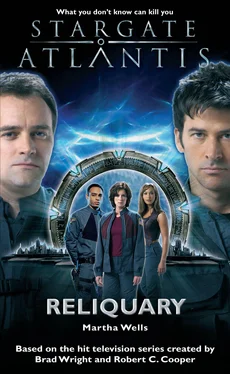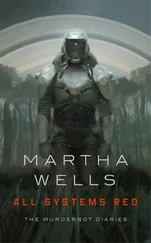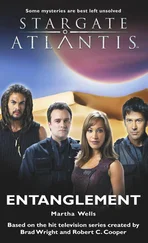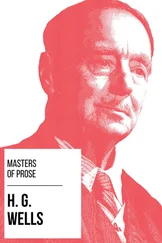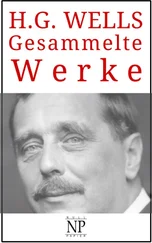Kavanagh stood a few steps away, staring intently at the sinking floor. John pointed out, “You could ask him.”
“I’m thinking out loud!” Rodney snapped. Asking Kavanagh for information was apparently a fate worse than death, to be resorted to only under the most extreme conditions.
Which meant John had to do it. “Kavanagh, how did you find this thing?”
He shook his head. “It was an accident. I must have triggered a circuit that still had power, even if it wasn’t showing up on the sensors.”
The rumbling stopped. McKay consulted the detector again, brow furrowed. “Still no life signs. I am getting low-level power signatures.”
“Right.” Not taking his eyes off the dust cloud above the spiral, John said, “Teyla?”
“Yes, Major Sheppard?”
“We’re still negative on sensing any Wraith, correct?”
Teyla sounded grim. “If that changes, Major, you will be the first to know.”
“Just checking. Everybody stay where they are.”
Moving forward cautiously, John heard Kolesnikova mutter, “I want to be the first to know, I need more time for running than the rest of you.”
Ford told her, “Don’t worry, we’ll take care of you.”
It was the right thing to say, and Ford sounded like he believed it; John just wished they could make those kind of guarantees. Kolesnikova had told him once that it was unlucky to be Russian and to be in the Stargate program. When John had finished reading the SGC reports he had understood why. Most of the scientists, techs, and field operatives in the original Russian program had been killed. The ones who had come over to work in the SGC hadn’t fared well either.
John got close enough to look down into the spiral’s shaft. It was round and carved from the rock substructure, with bands of a dull-gray metallic material. He reached the edge, where he could shine the light on his P-90 directly down, and saw the spiral had come to rest about fifty feet below. Small lights gave off a faint blue glow. They looked like emergency lights, meant to function under low power and guide the inhabitants out in a blackout. The air coming up from the shaft was cool and dry, laced with a musty odor. Oddly, it carried that hint of rot underneath that John could smell outside. He had thought it came from dead fish or other sea life washed up along the beach, but maybe not.
Shining the light around, John saw there was actually a ladder, set in under the edge of the floor, in the wall of the shaft. It was narrow, partly carved from the rock, with metal rails and treads, and it looked stable. But that first step is still a killer. This was obviously meant for emergency use only. “Guys,” John said, “We got a bunker here.”
After the Genii, John regarded all bunkers with suspicion on principle, but the detector still wasn’t finding any life signs, just the low and intermittent power readings. With that evidence, it wasn’t likely anybody had survived down there; or if they had, they had long since departed the area, and maybe the planet.
John sent Ford back to the jumper for some climbing rope and carabiners, then the others stood or crouched around the opening as he, John, and Teyla rigged a safety line. They had lost enough expedition members to dangers that couldn’t be avoided; John would be damned before he lost somebody because of a stupid fall.
“That’s a waste of time,” Kavanagh said, arms folded, his face tight with impatience.
Saving John the trouble, Rodney said, “There’s no way you’re getting me or anybody else — which includes you, whether you like it or not — on that insanely narrow ladder without something to grab on to when it inevitably gives way.”
“There could be a ZPM down there. A half a dozen ZPMs,” Kavanagh snarled. “We need to get down there and find them.”
His expression deeply sardonic, McKay drew breath to answer, but Kolesnikova cut him off by pointing out mildly, “There might be a hundred ZPMs, but they aren’t going anywhere in the next fifteen minutes.”
John checked the line where it was secured to a heavy pillar supporting the gallery. He still didn’t like splitting the team, but in this case there wasn’t much choice. Besides, he could tell Kolesnikova was nervous of the whole idea, and while John was willing to drag Rodney protesting and predicting their imminent deaths into these kinds of situations, he wasn’t willing to do it to the other civilians. At the moment, when they didn’t even know if there was anything useful down there, this was for volunteers only. “Ford, you’ll stay up here with Kolesnikova. Keep up the regular updates with Boerne’s group.”
A flicker of disappointment crossed Ford’s face. The kid was the poster boy for gung-ho; he actually wanted to go down into the dark hole to see what was there and hopefully kick its ass. But he said sharply, “Yes, sir.”
Kolesnikova just nodded, relieved. John could tell she had been willing to go if ordered to, but was more than glad to stay up here. “You will call us if there is anything of interest?”
Rodney leaned over to look down the shaft, his mouth set with distaste. “Call, scream, whichever seems more appropriate at the moment.”
Climbing down one by one with the safety line clipped to a harness was slow but uneventful. John went first and checked out the bottom of the shaft with the P-90’s light while he waited for the others. There was a big space at the bottom, with eight corridors leading off it. The walls were dark gray, metal bonded to rough stone, with the little blue globe lights set high in the ceiling. It was warm, but the air wasn’t as stale as it should have been; some kind of recycling system must still be minimally functional. The odor of rot came and went, drifting on some barely existent breeze. As McKay reached the bottom and extracted himself from his harness, John said, “Searching this place may take a little longer than we thought.”
“Always look on the bright side, Major.” McKay came over to join him at the entrance to the nearest corridor, getting the detector out of a vest pocket. He checked it again, then rolled his eyes. “Except there is no bright side. Power signatures are still present but intermittent. If there is a ZPM here, it’s turned off, drained, running on minimal capacity, or actively trying to play hide and seek with us. We’re going to have to find it the hard way.”
“Color me surprised.” John tapped his headset. “Ford, can you hear me?” No answer. “Crap.” He moved back into the shaft, into the fall of light from above. Kavanagh was nearly down, and Teyla was starting her climb, moving lightly and easily down the awkward ladder. “Ford?” he tried again.
The radio responded immediately, “Here, Major.”
“It looks like the shielding up there is interfering with our communications. We’ll come back here and check in on the hour.”
“Yes, sir. Be careful down there.”
McKay picked a corridor before Kavanagh could dispute the selection. John led the way, putting Teyla at their six. “The construction is more primitive down here than on the upper levels,” Kavanagh pointed out, as John moved his light over the walls and ceiling.
“More support for my theory.” McKay said this in a little singsong, calculated to drive Kavanagh insane.
It worked. “Your theory is crap,” Kavanagh snapped, his eyes on his own detector. “It could have been built later, when their resources started to fail.”
“Kids, don’t make me separate you,” John said, keeping his attention on the corridor ahead. “Or beat you unconscious.” Privately, he thought Rodney was right. The blue light gave everything a spooky glow, but their flashlights showed that the metallic material in the walls was rougher, with rivets and seams. There were gray-green patches that might be some kind of mold, creeping in wherever the metal met stone.
Читать дальше
